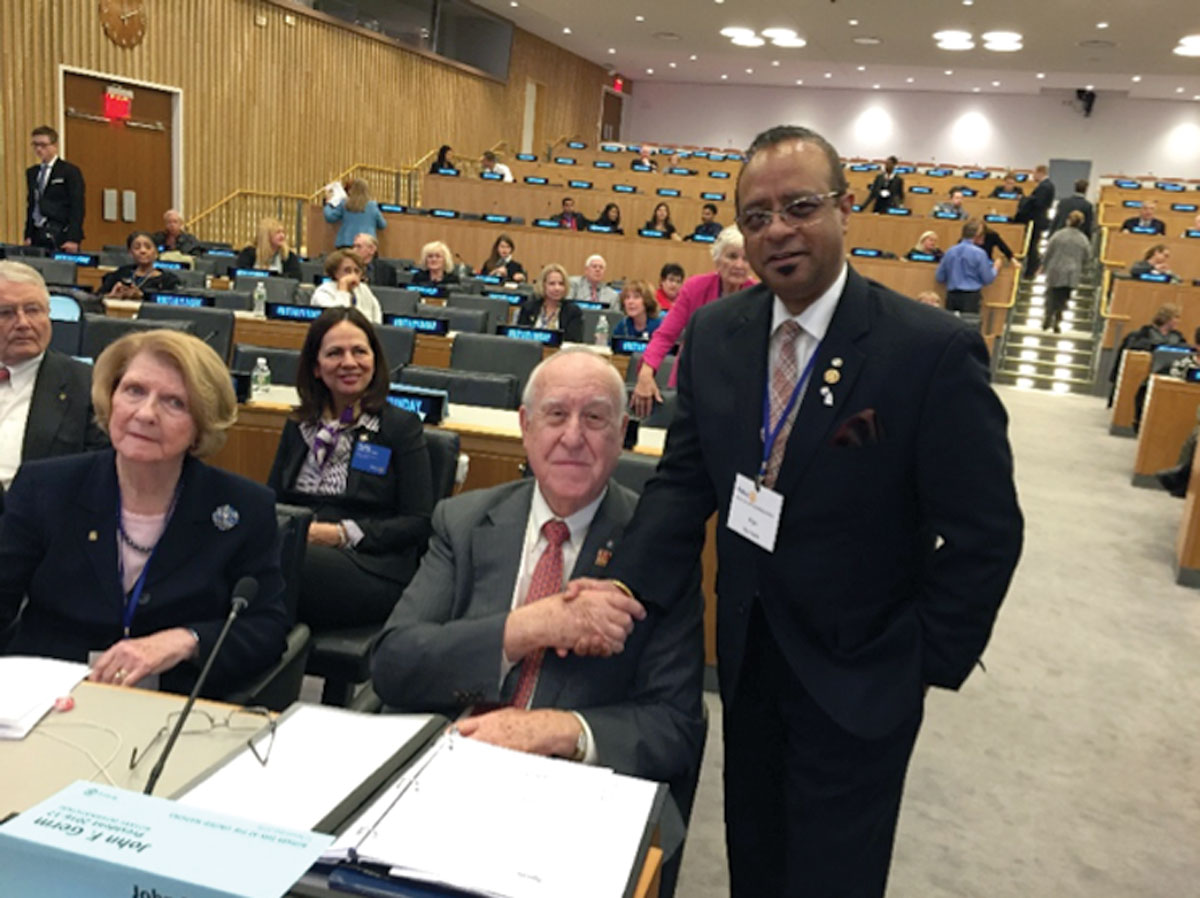ROTARY AND THE UNITED NATIONS
Rotary International President John Germ and Assistant Governor Vijay Gupta of Rotary Dist 7510, NJ. (Courtesy: Vijay Gupta)
Rotary’s relationship with the United Nations dates back to 1945 when some 49 Rotary members acted as delegates, advisors and consultants at the United Nations Charter Conference. Today, Rotary holds the highest consultative status possible with the United Nations as a non-governmental organization. Rotary and the United Nations have a long history of working together and share similar visions for a more peaceful world. – #Siliconeer @Siliconeer #RotaryInternational #Rotary #Interact #UN #UnitedNations #VijayGupta #SureshGoklaney #CleanWater #India
In 1945, nearly 50 of the 800 delegates representing their governments at the San Francisco Conference to draft the UN Charter were also members of Rotary. The role of Rotary clubs in promoting understanding among nations, providing a platform for dialogue, and creating positive change in communities around the world provided valuable support for the newly established United Nations.
Rotary and the United Nations have since built a strong and productive partnership. In 1985, Rotary launched its PolioPlus program, the first initiative to tackle global polio eradication through the mass vaccination of children. The Global Polio Eradication Initiative, formed in 1988, is a public-private partnership that includes the World Health Organization and UNICEF, along with other key agencies.
Today, there are only two countries that have never stopped transmission of the wild poliovirus: Afghanistan and Pakistan. Less than 370 polio cases were confirmed worldwide in 2014, which is a reduction of more than 99.9 percent since the 1980s, when the world saw about 1,000 cases per day.

Rotary holds the highest nongovernmental consultative status with the United Nations Economic and Social Council, which oversees many of the UN’s specialized agencies. Rotary maintains ties with the United Nations and other organizations through its network of 31 representatives in 15 capital cities around the world. Rotary representatives, including two youth representatives, serve as unofficial ambassadors, meeting with colleagues to share information and opportunities for collaboration.
Rotary’s representative network is active at the UN offices in New York, Geneva and Vienna, and the Economic Commissions for Africa, Asia, Western Asia, Europe and Latin America. Rotary also has representatives at UNESCO, UN-HABITAT, the UN Environmental Program, the Food and Agricultural Organization, World Food Program, UNICEF, World Health Organization and World Bank.
Rotary Day at the United Nations is an annual event organized by the Rotary Representatives to the UN in New York to celebrate our joint efforts and inspire further collaboration for a sustainable world.
The theme of this year’s gathering at UN headquarters in New York City, “Responsible Business, Resilient Societies,” recognizes Rotary’s role at the intersection of commerce and cause. As leaders in their professions and communities, Rotary members often use their professional skills and networks to advance social causes, particularly economic development.
Among the six Rotary Responsible Business honorees and two business partners recognized this year at the UN gathering for their inclusive business practices and outstanding contributions to improving their communities was Suresh Goklaney from Rotary Club of Bombay, India.
Goklaney, executive vice chair of a large manufacturer of UV water purification systems, has led efforts to provide clean water in rural villages and impoverished urban areas throughout India. The project has also established centers where local women can sell clean water to generate income.


